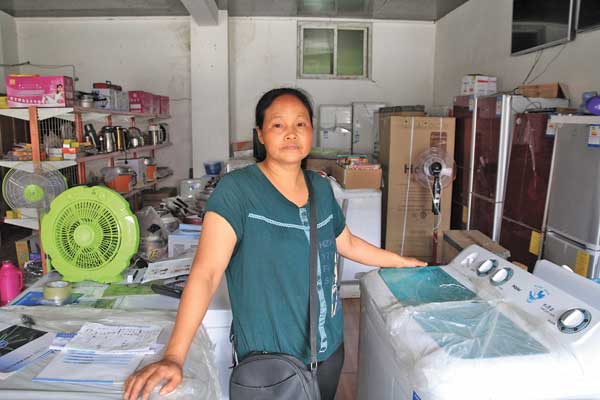A country practice
 |
| Chen Xianxiu at her electrical-appliance store. Wang Huazhong / China Daily |
Surgery success
Deng had a rare chance to receive one-year training outside Medog in 2001, and he made history by completing the first surgery in the county after he returned and started working in the county hospital in 2002.
The success of the surgery, despite being very small, made Deng well-known around the town. In 2004, he completed the first major surgery ever performed in the county.
It was an emergency Cesarean section for a 36-year-old mother, who was having difficulty giving birth.
Deng had to overcome different challenges then. Surgeries - which require cutting with a knife on the body - were against local tradition, and the patient's family didn't agree to the surgery for two days.
Meanwhile, risk of infection was high as there were limited facilities and no professional surgery assistants. Blood supply was also a big problem because of the poor roads.
"I was not a professional gynecologist. I was under great pressure, as it was my first time to perform such surgery," recalls Deng.
However, the situation gave him no time to hesitate. It usually took several days on bumpy mountain roads for pregnant mothers, on foot or on stretchers, to get to hospitals outside Medog.
"But there was no time, and the mountain roads were too risky for her," Deng recounts. "I was snatching at straws."
He can still recall his nervousness.
"When I finally took out the baby, I felt that I had no strength to hold it because I was trembling," Deng says. Several assisting senior doctors had never seen a real surgery before that moment.
There was only a small hydropower station in Medog and medical equipment often wore out or didn't work properly because of the unstable voltage.
"No one knew how to fix them once they were broken," Deng says.
Electricity was often cut. They had to perform operations by flashlight in some urgent cases, says Deng, who finished operations, including a hernia, with several people holding flashlights for light.
"The patients' lives will be in danger if we don't do surgery because it usually takes too long to transport them out."
They were finally able to properly use their X-ray scanner in 2010, when the county got a larger power station.
Now the director of Medog's county hospital, Deng says the improvement of the roads in recent years has greatly benefited his work.
"The road has really saved lives of many, especially critical patients who need to be sent to better hospitals urgently," he says.
Meanwhile, medicines can easily be brought in by vehicles. Before, medicines for the whole county were brought in on human backs. They were ordered once a year and had to endure several transfers before arriving in town.
"We were short of medicines, and often they went out of date in the transfer station on the mountain because we were unable to bring them," Deng says. It was even harder to bring in medical equipment, and damage during transport was common.
"Though most of them had limited medical knowledge, medical workers would refuse rare chances to train outside because it'd take them nearly 10 days walking on the bad roads," Deng adds.
Regional diseases, such as malaria, had a high mortality rate in the past because of limited medical staff and diagnosis facilities.
Related:
- Doctors share their tales of life and death
- Not what the doctor ordered
- Doctor puts his life in danger to save others
- The way to health is through the stomach
- Biggest restaurant in Lhasa carries forward Tibetan food culture
- An artist's self-discovery in Tibet
- Must-read for foreigners to travel in Tibet
















